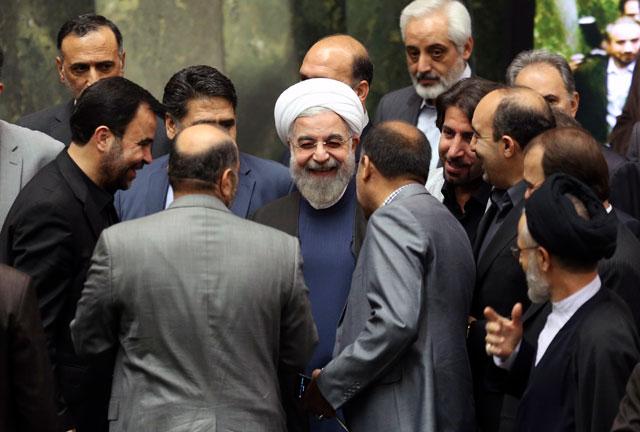You are here
Much to lose for Iran’s Rouhani if no nuclear pact
By AFP - Nov 19,2014 - Last updated at Nov 19,2014

TEHRAN — The Iranians conducting nuclear talks with world powers seem loath to use the word "compromise", but with much to lose President Hassan Rouhani may yet be pushing for a last-minute deal.
Negotiations to reach a final agreement on Iran's disputed atomic programme — culminating this week in Vienna ahead of a November 24 deadline — have divided the Islamic republic.
On one side stand hardline conservatives opposed to giving almost any ground to hated Western governments.
On the other is Rouhani, who put his credibility on the line and raised hopes of an end to isolation — and the possibility of conflict — by officially restarting the nuclear talks in 2013.
Standing in the middle is Iran's supreme leader, Ayatollah Ali Khamenei, who will have the final word on any agreement, and whom Rouhani must convince of the merits of doing a deal.
Of all the powerbrokers in Tehran — politicians, clerics, generals, business leaders and academics all have influence — Rouhani has the most at stake if Khamenei does not ultimately back him.
"If these talks turn out to be a failure, or are seen as such, Mr Rouhani will be in a very difficult position," said Davoud Hermidas-Bavand, a Tehran-based analyst and veteran watcher of Iran's political scene.
"The die-hard groups who threaten the atmosphere of cooperation will say Mr Rouhani failed to do anything and it will be hard for him to tell the public that he has kept his promises," he added.
Khamenei holds the cards
Away from the nuclear negotiating table, Rouhani's plans to introduce more moderate domestic policies are under attack, as are his ministers — one has already been impeached and dismissed by parliament.
On Tuesday, lawmakers for the second time refused to approve a replacement.
So it is especially important for Rouhani to win a nod from Khamenei for a deal, or even just on a framework for an extension.
The leader's towering influence would silence those critical of Rouhani and Iran's negotiators, led by Foreign Minister Mohammad Javad Zarif.
Without such an endorsement, both Rouhani and Zarif could begin to look like lame ducks, said Siavush Randjbar-Daemi, a lecturer on Iran and the Middle East at Britain's Manchester University.
"A breakdown in the talks will weaken Rouhani and possibly cause the end of Zarif's tenure as foreign minister," Randjbar-Daemi said.
The big question is whether Rouhani can balance his desire for a deal with Iran's need to save face and preserve its nuclear programme.
Upping the stakes
Talks between Iran and the P5+1 powers (UN Security Council members Britain, China, France, Russia and the United States plus Germany) have been taking place in a better atmosphere than in the past but momentum has stalled lately.
And Tehran's price for reaching an agreement has been steadily ticking up.
On July 7 — just 13 days before an original deadline for a final deal — Khamenei laid down new conditions, stating Iran would eventually require a uranium enrichment capacity almost 20 times greater than at present.
The West had wanted a reduction and that deadline was missed.
In the past month Iran again raised the stakes, demanding a total immediate lifting of sanctions imposed by the United States, the UN Security Council and the European Union — a condition seen as inflated and impractical.
While this may be a negotiating ploy, Zarif's team could lose out if there is no compromise, said Randjbar-Daemi.
"I believe this is the message the Iranians will deliver privately and discreetly in Vienna — that of a possibly very different team showing up, if and when talks resume after the current round breaks down," he said.
"There is a need to strike a deal while there is leeway to do so."
Economic forces are also at play. Without an agreement it is hard to see how foreign investment, promoted aggressively by the government as a boon to jobs, can return.
"What Rouhani will have to face, should the talks end without result, is a very sullen atmosphere in the business sector, which had pinned much hope in a deal being reached," Randjbar-Daemi added.
Related Articles
Iran and world powers embark Tuesday on the Herculean task of transforming their interim nuclear deal into a long-term accord satisfying all sides and silencing talk of war for good.
Iranian Foreign Minister Mohammad Javad Zarif told top clerics Tuesday a letter from Republican senators undermining a possible nuclear deal had sapped Tehran's confidence in dealings with the United States.
Iran's foreign minister has warned the United States that failure to agree a nuclear deal would likely herald the political demise of pragmatist President Hassan Rouhani, Iranian officials said, raising the stakes as the decade-old stand-off nears its end-game.
















